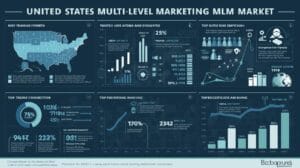The MLM industry continues to reshape the global marketplace in 2025, with giants like Atomy USA and Amway Mexico leading regional markets while companies like PM-International Canada and Infinit Nutrition expand their reach. This comprehensive analysis is for aspiring entrepreneurs, current distributors, industry investors, and business professionals looking to understand market dynamics and identify opportunities in direct selling.
MLM companies now generate hundreds of billions in combined revenue worldwide, with Amway dominating at over $8.9 billion annually while emerging players like South Korea’s Atomy crack the billion-dollar mark. The landscape spans from traditional wellness products to innovative tech solutions, each requiring sophisticated best mlm software to manage complex compensation structures and global distribution networks.
We’ll examine the current revenue rankings and market positions of leading MLM companies across different regions, analyze how top performers like Amway maintain their competitive edge through product innovation and digital transformation, and explore high-growth international markets where companies are expanding their operations and recruiting new distributors.
Global MLM Industry Revenue Leaders and Market Rankings

Top 10 Worldwide MLM Companies by Revenue Performance
The global MLM industry demonstrates remarkable financial strength through its top-performing companies, with revenue figures reaching into the billions. Leading this impressive roster, Amway stands as the undisputed revenue champion, generating $7.4 billion in 2024, though experiencing a 4% decline from its 2023 performance of $7.7 billion. This slight downturn reflects broader market challenges while maintaining its dominant position in the direct selling sector.
Herbalife secures the second position with $5.0 billion in revenue for 2024, showing minimal decline of just 1% from its 2023 figures of $5.062 billion. The company’s resilience in maintaining near-stable revenue demonstrates its strong market foundation and customer loyalty.
eXp Realty emerges as a notable growth performer, achieving $4.567 billion in 2024—a impressive 6% increase from $4.3 billion in 2023. This upward trajectory positions the company as one of the few major players experiencing positive growth in the current market environment.
These top-performing MLM companies collectively demonstrate the formidable nature of direct selling as a business model in 2025. Through decades of operation, many have evolved from humble beginnings into multi-billion-dollar enterprises with global footprints spanning dozens of countries, employing hundreds of thousands while serving millions of customers worldwide.
Revenue Distribution Across Geographic Markets
The geographical diversity among MLM revenue leaders proves equally noteworthy, with headquarters spanning multiple continents and reflecting the global nature of direct selling success. The United States maintains a strong presence as the home base for several top performers, including Amway, Herbalife, and eXp Realty, highlighting America’s continued dominance in the MLM sector.
However, the global footprint extends far beyond American borders, with successful companies headquartered from South Korea (Atomy) to Brazil (Natura & Co) and Germany (Vorwerk). This international perspective allows these organizations to adapt successful strategies across different markets while maintaining cultural relevance in their respective regions.
The revenue distribution reflects not just company origins but also market penetration strategies, where leading MLM companies have established significant operations across dozens of countries. This geographic diversification serves as both a growth driver and risk mitigation strategy, allowing companies to balance market fluctuations across different regions.
Growth Trends and Market Share Analysis
Analyzing growth trends reveals a mixed landscape within the MLM industry’s top tier. While some companies face modest revenue declines, others demonstrate positive momentum that suggests continued evolution and adaptation within the sector. The collective revenue performance of these 15 leading companies generates tens of billions annually, underscoring the substantial economic impact of the direct selling model.
Product diversity stands out as a defining characteristic among these leaders, with companies spanning numerous sectors—from nutrition and home products to environmental appliances and financial services. This diversification strategy proves crucial for sustained growth, allowing companies to capture different market segments and consumer preferences.
The longevity and financial performance of these industry leaders provide strong evidence that when executed properly, the direct selling model offers legitimate opportunities. Their continued growth trajectories suggest the direct selling model will remain viable despite changing consumer behaviors and economic challenges, supported by robust digital transformation initiatives and significant investments in product research and development.
Amway’s Dominant Market Position and Business Strategy
Product Portfolio Excellence Across Health, Beauty and Home Care
Amway’s market dominance stems from its comprehensive product portfolio spanning three core categories that address fundamental consumer needs. The company manufactures and markets an extensive range of consumer products across health, nutrition, beauty, personal care, home care, and electronics segments. This diversified approach positions Amway to capture multiple revenue streams while serving varied customer preferences across global markets.
The nutrition category represents Amway’s crown jewel, accounting for 64% of total global sales and experiencing 2% growth in 2024. The Nutrilite™ brand maintains its position as the world’s No. 1 selling vitamin and dietary supplements brand, leveraging the company’s expertise in plant science and continued investment in gut microbiome research. This scientific foundation enables Amway to offer evidence-based wellness solutions that resonate with health-conscious consumers worldwide.
Building on this nutritional strength, Amway has introduced innovative “solutions” – curated product combinations paired with recommended daily habits that help customers adopt a more holistic approach to wellbeing. For instance, the Gut Health solutions combine plant protein powders, fiber supplements, and probiotics to support comprehensive wellness with a focus on digestive health. This strategic packaging makes it easier for consumers to start and maintain healthy habits while providing business owners with powerful tools to guide customer wellness journeys.
The company’s portfolio extends beyond nutrition to include top-selling brands Artistry™ for beauty and XS™ for energy products, creating a well-rounded offering that addresses lifestyle needs across demographic segments.
Global Distribution Network of 3 Million Independent Business Owners
Now that we have covered Amway’s product excellence, the company’s distribution strategy represents one of the most extensive networks in the direct selling industry. Amway operates through independent “distributors” known as Amway Business Owners (ABOs) who sell the company’s consumer products across more than 100 countries and territories, serving over 1,000 different markets globally.
This business model centers on people who wish to start or advance an independent small business, with Amway providing the infrastructure and support systems necessary for success. The company has established several business units or “units of distribution” tailored to specific markets where it executes business operations, allowing for localized approaches while maintaining global consistency.
Through these individual distributors, Amway has entered into partnerships with various regional business owners across countries worldwide, implementing its business model on a truly global scale. This approach has significantly increased Amway’s market penetration in the retail industry while creating entrepreneurial opportunities for millions of individuals seeking business ownership.
The strength of this network lies in its personal relationships and direct customer engagement, where ABOs can provide customized guidance and support for customers’ wellness journeys. This human-centered approach differentiates Amway from traditional retail models and creates deeper customer loyalty through personalized service and product recommendations.
Digital Transformation and Modern Sales Technology Integration
With this extensive physical network in mind, Amway has recognized the critical importance of digital transformation in modern commerce. The company has made significant investments in enhancing its digital capabilities to support both business owners and customers in an increasingly connected world.
Amway’s website has become more accessible and user-friendly, opening wide for everyone to view the company’s extensive product catalog. This digital presence enables the company to implement various sales techniques and promotional strategies more effectively, including frequent offers and discount campaigns that provide up to 20-30% off retail prices.
The digital transformation extends beyond simple e-commerce functionality to include comprehensive support systems for ABOs. Modern sales technology integration helps business owners manage their operations more efficiently while providing customers with seamless shopping experiences across multiple touchpoints.
However, the reference content indicates that Amway still has significant opportunities to explore digital marketing more extensively. The company could potentially leverage brand influencers such as YouTubers and social media personalities to expand its reach, particularly among younger demographics who prefer digital-first experiences.
This technological evolution supports Amway’s traditional strengths while positioning the company for future growth in an increasingly digital marketplace, ensuring that the extensive ABO network remains competitive and relevant in modern commerce environments.
Regional MLM Market Leaders and Their Specializations

Chinese Market Giants: Infinitus, Perfect China, and JoyMain International
China’s MLM landscape stands as one of the most complex and lucrative markets globally, dominated by companies that have successfully navigated strict regulatory frameworks while building massive distribution networks. The Chinese market requires specialized approaches to product development, compensation structures, and cultural adaptation that set these companies apart from their Western counterparts.
Infinitus has established itself as a powerhouse in the Chinese health and wellness sector, specializing in traditional Chinese medicine (TCM) products combined with modern nutritional science. Their product portfolio focuses heavily on herbal supplements, functional foods, and personal care items that resonate with Chinese cultural preferences for natural healing methods. The company’s strength lies in its ability to bridge traditional medicine with contemporary MLM distribution models, creating products that appeal to both older generations seeking familiar remedies and younger consumers interested in wellness trends.
Perfect China operates with a distinct focus on household products and daily necessities, positioning itself as a comprehensive lifestyle brand. Their specialization extends beyond typical MLM offerings to include cleaning products, kitchen appliances, and home care solutions that integrate seamlessly into Chinese family life. This domestic-focused approach has enabled Perfect China to build deep community connections and establish trusted relationships with distributors who understand local market needs and preferences.
JoyMain International distinguishes itself through premium positioning and international product sourcing, specializing in high-end nutritional supplements and beauty products. Their strategy involves importing quality ingredients and finished products from established international markets while adapting marketing messages and product formulations for Chinese consumers. This approach allows them to command premium pricing while maintaining the perceived value associated with international brands.
European Success Stories: Vorwerk Germany and Oriflame Sweden
European MLM companies have carved distinct niches by leveraging their regional strengths in manufacturing excellence, design innovation, and quality standards. These companies demonstrate how European values of craftsmanship and reliability translate into successful MLM business models.
Vorwerk Germany represents the pinnacle of engineering excellence in the MLM industry, specializing in high-performance household appliances and cleaning systems. Their flagship Thermomix product line exemplifies German engineering principles applied to direct sales, offering multi-functional kitchen appliances that justify premium pricing through superior quality and durability. Vorwerk’s specialization extends to comprehensive home care solutions, including their renowned Kobold vacuum systems, which have become synonymous with German precision and reliability in household cleaning technology.
The company’s success stems from their ability to position products as long-term investments rather than consumable goods, creating a unique value proposition in the MLM space. Their training programs emphasize product demonstration and education, reflecting the technical sophistication of their offerings and the need for distributors to understand complex product features.
Oriflame Sweden has built its empire around cosmetics and personal care products, leveraging Scandinavian design principles and natural ingredient sourcing. Their specialization focuses on beauty products that embody Swedish ideals of natural beauty, sustainability, and minimalist elegance. The company’s product development emphasizes organic ingredients, environmentally conscious packaging, and innovative formulations that appeal to quality-conscious European consumers.
Oriflame’s approach to MLM differs from traditional models by incorporating elements of social selling and beauty consultation, positioning their distributors as beauty advisors rather than traditional salespeople. This strategy has proven particularly effective in European markets where consumers value expertise and personalized recommendations.
Emerging Asian Markets: Atomy South Korea and Japanese Companies
Asian markets beyond China present unique opportunities for MLM companies that understand regional nuances and cultural preferences. South Korea and Japan have emerged as particularly sophisticated markets for direct sales operations.
Atomy South Korea has revolutionized the Asian MLM landscape through its innovative approach to product quality and pricing strategy. Unlike traditional MLM companies that rely on premium pricing to support multiple commission levels, Atomy specializes in offering high-quality products at competitive prices while maintaining profitable compensation structures. Their product range spans personal care, household items, and nutritional supplements, all developed with Korean innovation and quality standards.
Atomy’s specialization includes leveraging advanced manufacturing partnerships and supply chain optimization to deliver superior value propositions. Their success in markets like Atomy USA demonstrates how Korean MLM innovations can translate across cultural boundaries while maintaining core operational principles.
Japanese MLM companies have distinguished themselves through meticulous attention to product quality, customer service excellence, and sophisticated distributor training programs. These companies typically specialize in health and wellness products that incorporate traditional Japanese health philosophies with modern nutritional science. Their approach emphasizes long-term relationship building, consistent quality delivery, and comprehensive support systems for distributors.
The Japanese market’s emphasis on group harmony and collective success has influenced how these companies structure their compensation plans and training methodologies, creating models that prioritize team building and mutual support over individual competition. This cultural adaptation has proven essential for sustained success in Asian markets where relationship dynamics significantly influence business outcomes.
United States MLM Market Analysis and Top Performers

Revenue Leaders: Herbalife, eXp Realty, and Primerica Performance
The United States MLM landscape demonstrates remarkable diversity in revenue generation across different sectors. Herbalife stands as one of the most recognized MLM companies in the USA, generating substantial revenue through its nutrition-focused products since its founding by Mark Hughes in 1980. The company’s flagship Formula 1 Healthy Meal Nutritional Shake Mix and Herbalife24 Rebuild Strength post-workout recovery shakes have established strong market positions in the wellness category.
eXp Realty represents a revolutionary approach to real estate MLM, achieving extraordinary growth with annual revenues of $4.5 billion. Founded in 2009 in Bellington, Washington, this cloud-based real estate company has disrupted traditional business models through its virtual platform and unique revenue-sharing program. The company operates on an innovative 80/20 commission split, where agents retain 80% of earned commissions, with the ability to keep 100% after crossing the yearly cap of $16,000.
Primerica, established in 1977 and headquartered in Duluth, Georgia, generates $3 billion in annual revenue through financial services. The company specializes in term life insurance, investment and retirement solutions, and debt management programs targeting middle-income families. Representatives earn commissions through personal sales and override income from team member sales they recruit and supervise.
Specialized Market Segments: Essential Oils, Solar, and Real Estate
Now that we have examined the revenue leaders, specialized market segments showcase the diverse opportunities within the US MLM landscape. The essential oils segment demonstrates significant momentum, with doTERRA achieving $2 billion in annual revenue and maintaining an 11% growth rate. Founded in 2008, doTERRA has established itself as a dominant force in wellness products, capitalizing on consumer preferences for natural health solutions.
The real estate segment shows exceptional performance across multiple companies. Beyond eXp Realty’s dominance, REAL Brokerage demonstrates remarkable growth potential with $1.2 billion in annual revenue and an impressive 83% growth rate since its 2014 founding. This sector benefits from the substantial transaction values inherent in real estate deals, creating higher commission opportunities for distributors.
Financial services represent another specialized high-growth area, with companies like Family First Life generating $775 million annually while maintaining a 54% growth rate. World Financial Group contributes $1.5 billion in revenue with steady 15% growth, indicating the sector’s stability and consumer demand for financial guidance and insurance products.
| Market Segment | Top Performer | Annual Revenue | Growth Rate |
| Essential Oils | doTERRA | $2 billion | 11% |
| Real Estate | eXp Realty | $4.5 billion | 6% |
| Financial Services | Primerica | $3 billion | 12% |
DSA Recognition and Industry Awards for Innovation
With this performance data in mind, industry recognition validates these companies’ market positions and innovative approaches. Herbalife received multiple prestigious acknowledgments, including being named a 2025-2026 Best Company to Work For by U.S. News & World Report. The company’s commitment to employee experience and career growth earned additional recognition through Brandon Hall Group Gold Awards for its HN Grow learning app in compliance and external training categories.
eXp Realty garnered significant industry acclaim with the Global Vision Award in June 2025 at the international MLS forum for innovation and global impact. The company’s South African division won the Reside Awards – Residential Estate Agency of the Year 2025, while Corporate Vision Magazine recognized the company with Corporate Excellence Awards in 2024.
Primerica demonstrates consistent recognition across multiple categories, earning acknowledgment from Forbes in 2025 as America’s Greatest Workplaces for Women and Diversity. The company appeared on the Fortune 1000 list in 2024 and received recognition from Newsweek in its third-annual ranking as America’s Greatest Workplaces 2025. These awards reflect the company’s commitment to workplace excellence and diversity initiatives within the financial services MLM sector.
High-Growth International Markets and Opportunities

India’s MLM Landscape: Mi Lifestyle, Vestige, and Local Champions
India represents one of the most dynamic MLM markets globally, with several domestic companies achieving remarkable success alongside international giants. The country’s vast population, growing middle class, and increasing digital penetration have created an ideal environment for direct selling businesses to flourish.
Mi Lifestyle has emerged as a prominent player in India’s MLM sector, building a strong presence through its diverse product portfolio and innovative compensation structure. The company has successfully adapted international MLM practices to suit local preferences and cultural nuances, establishing a robust distributor network across urban and rural markets.
Vestige stands out as another significant force in the Indian MLM landscape, demonstrating how local companies can compete effectively with global brands. The company has built its reputation on quality products and transparent business practices, focusing particularly on health and wellness categories that resonate strongly with Indian consumers.
Local champions in India’s MLM market have shown remarkable adaptability, often outperforming international competitors by better understanding regional preferences and distribution challenges. These companies have leveraged India’s extensive network of small towns and rural communities, areas where traditional retail infrastructure remains limited but MLM networks can thrive.
The regulatory environment in India has evolved to provide clearer guidelines for MLM operations, helping legitimate companies distinguish themselves from fraudulent schemes. This regulatory clarity has contributed to increased consumer confidence and sustainable growth in the sector.
Australia’s Direct Selling Market Leaders and Consumer Preferences
Australia’s direct selling market demonstrates sophisticated consumer preferences and established market leaders who have built strong foundations over decades. The market is characterized by high consumer awareness and regulatory compliance standards that ensure sustainable business practices.
Consumer preferences in Australia lean heavily toward premium quality products, particularly in health and wellness categories. Australian consumers are willing to pay premium prices for products that demonstrate clear value propositions and proven results. This preference has shaped the competitive landscape, favoring companies that invest heavily in product development and scientific validation.
Market leaders in Australia have established comprehensive training programs and support systems for their distributor networks. These companies understand that Australian consumers value professional presentation and detailed product knowledge, leading to more sophisticated sales approaches compared to other international markets.
The digital transformation of Australia’s direct selling sector has been particularly notable, with leading companies implementing advanced e-commerce platforms and social media strategies. This technological adoption has enabled distributors to reach broader audiences while maintaining the personal touch that defines successful direct selling relationships.
China’s Regulatory Environment and Market Dynamics
China’s MLM market operates under one of the world’s most stringent regulatory frameworks, creating unique challenges and opportunities for both domestic and international companies. The regulatory environment has been shaped by past experiences with fraudulent schemes, leading to comprehensive oversight mechanisms.
The Chinese government maintains strict licensing requirements for direct selling operations, with only approved companies permitted to operate legally in the market. This regulatory approach has created barriers to entry but has also provided legitimacy and consumer protection for authorized operators.
Market dynamics in China are heavily influenced by the country’s rapid urbanization and growing consumer sophistication. Chinese consumers increasingly seek premium international brands, creating opportunities for global MLM companies that can navigate the complex regulatory landscape successfully.
Technology plays a crucial role in China’s MLM sector, with companies leveraging advanced digital platforms, mobile payment systems, and social commerce strategies. The integration of traditional MLM practices with cutting-edge technology has created new models for customer engagement and distributor support.
The compensation structures approved for China often differ significantly from those used in other markets, requiring companies to adapt their business models while maintaining compliance with local regulations. This adaptation has led to innovative approaches that balance regulatory requirements with distributor motivation and company profitability.
Product Category Trends and Consumer Preferences
Health and Wellness Dominance in MLM Product Lines
Health and wellness products have emerged as the undisputed leaders in the MLM industry, representing the largest product category across global markets. This dominance stems from growing consumer awareness about preventive healthcare and the increasing demand for natural, supplement-based solutions to everyday health concerns.
The appeal of health and wellness products in MLM extends beyond just market size – these products naturally align with the relationship-based selling model that defines multi-level marketing. Distributors can share personal transformation stories, demonstrate real results, and build authentic connections with customers who are actively seeking solutions for their health goals.
Major MLM companies have built their entire business models around comprehensive wellness ecosystems. These product lines typically include nutritional supplements, weight management solutions, energy boosters, immune support products, and targeted health formulations. The recurring nature of health and wellness consumption makes these products ideal for subscription-based models, ensuring consistent customer retention and distributor income.
Consumer preferences in this category have shifted toward products with transparent ingredient sourcing, scientifically-backed formulations, and clean labeling. Modern health-conscious consumers demand detailed information about product origins, manufacturing processes, and clinical research supporting health claims. This trend has pushed MLM companies to invest heavily in research and development, third-party testing, and comprehensive quality assurance programs.
The global wellness market’s continued expansion, coupled with aging populations in developed markets and rising health awareness in emerging economies, positions health and wellness products as the cornerstone of successful MLM operations worldwide.
Beauty and Personal Care Market Positioning
Beauty and personal care products occupy a significant position in the MLM landscape, leveraging the power of personal recommendation and demonstration that makes network marketing particularly effective for cosmetic and skincare solutions. This category thrives on the visual and experiential nature of beauty products, where before-and-after results can be easily shared and demonstrated within distributor networks.
The MLM beauty sector has evolved to encompass premium skincare lines, color cosmetics, anti-aging treatments, and specialized beauty devices. Many companies have positioned themselves in the luxury beauty segment, offering professional-grade products that compete directly with department store brands while maintaining the personalized service element that traditional retail cannot match.
Social media integration has revolutionized how beauty MLM products are marketed and sold. Distributors utilize platforms like Instagram, TikTok, and Facebook to showcase product applications, share makeup tutorials, and display real customer transformations. This visual storytelling approach has proven particularly effective for building trust and driving sales in the beauty category.
The trend toward clean beauty and sustainable packaging has significantly influenced product development in MLM beauty companies. Consumers increasingly demand products free from harmful chemicals, cruelty-free formulations, and environmentally conscious packaging solutions. This shift has prompted many MLM beauty brands to reformulate existing products and develop new lines that meet these evolving consumer expectations.
Personalization has become a key differentiator in MLM beauty, with companies offering customized skincare regimens based on individual skin types, concerns, and goals. This personalized approach strengthens the distributor-customer relationship and increases customer lifetime value through tailored product recommendations.
Technology and Service-Based MLM Business Models
The MLM industry has witnessed a significant transformation with the emergence of technology and service-based business models that extend beyond traditional physical products. These innovative approaches leverage digital platforms, software solutions, and service offerings to create sustainable income opportunities for distributors while addressing modern consumer needs.
Technology-driven MLM models often center around digital marketing services, e-commerce platforms, and business automation tools. These companies provide distributors with sophisticated software solutions that can be marketed to small businesses and entrepreneurs seeking to streamline their operations or enhance their digital presence. The recurring nature of software subscriptions creates stable monthly income streams for distributors while delivering ongoing value to end users.
Service-based MLM businesses have expanded to include financial services, educational programs, travel booking platforms, and digital communication solutions. These models typically require lower inventory investments and reduced shipping complexities compared to traditional product-based MLMs, making them attractive to distributors seeking flexibility and reduced operational overhead.
The integration of artificial intelligence and automation tools has enabled MLM companies to offer sophisticated business solutions that were previously only available to large enterprises. AI-powered lead generation systems, automated marketing platforms, and customer relationship management tools have become popular offerings in technology-focused MLM companies.
Mobile-first approaches have become essential for technology-based MLM models, with companies developing comprehensive mobile applications that enable distributors to manage their businesses, track performance, and engage with customers from anywhere. These platforms often include integrated payment processing, inventory management, and communication tools that streamline the entire business operation process.
Compensation Plans and Business Opportunity Analysis
Multi-Stream Income Models: Retail Profits and Performance Bonuses
MLM compensation plans are fundamentally designed around multi-stream income generation, combining retail profits with performance-based bonuses to create comprehensive earning opportunities for distributors. When evaluating compensation plans, the most successful models reward distributors primarily for direct sales rather than override commissions, establishing a sustainable foundation for long-term business growth.
The four major compensation plan types each offer distinct approaches to multi-stream income:
Unilevel Plans provide straightforward commission structures where distributors earn from multiple levels of their organization without advancement requirements. While easy to understand and administer, these plans typically limit payout depths, encouraging width over depth in team building.
Stairstep Breakaway Plans represent the most established model, allowing distributors to advance in rank and “break away” from their original sponsorship line. This creates dual income streams: direct commissions from personal sales and override percentages from breakaway organizations. These plans excel at rewarding both volume and performance, though their complexity can challenge new distributors.
Matrix Plans restrict distributor width at each level (such as 3-by-5 matrices), creating automatic spillover that can benefit positioned distributors. However, regulatory scrutiny often targets these plans due to their game-like appearance and potential for fostering nonproductive distributors.
Binary Plans focus on building two legs with balanced volume requirements, offering group cooperation incentives and weekly payouts. Despite controversy from their origins in questionable programs, legitimate companies have successfully adapted binary structures for consumable products.
Leadership Development and Team Building Incentives
Effective compensation plans incorporate specific incentives that reward distributors for training and supporting their downline organizations. The most successful MLM companies recognize that sustainable growth depends on leadership development rather than pure recruitment numbers.
Quality compensation plans include several key leadership incentives:
Training and Support Rewards acknowledge distributors who actively mentor their teams through formal recognition programs and bonus structures tied to downline performance improvements. These incentives ensure experienced distributors remain invested in their team’s success rather than focusing solely on personal recruitment.
Volume-Based Recognition combines high personal volume requirements with group volume achievements, creating balanced incentives that prevent over-emphasis on recruitment at the expense of product sales. Plans should reward distributors for maintaining consistent monthly volumes while building substantial team organizations.
Lock-In Features protect distributors who achieve certain performance levels from demotion due to temporary volume drops, encouraging long-term commitment to leadership roles. This stability allows leaders to focus on team development without fear of losing their positions during market fluctuations.
Non-Monetary Incentives such as company cars, health insurance, travel rewards, and exclusive training opportunities provide additional motivation for sustained leadership performance. These perks create aspirational goals that extend beyond pure financial compensation.
Digital Tools and Support Systems for Distributors
Modern MLM companies leverage sophisticated digital platforms to support distributor success through comprehensive training systems, automated marketing tools, and real-time performance tracking. These technological solutions address the historical challenges of distributor support and business management.
Contemporary compensation plans integrate digital support through multiple channels:
Automated Commission Tracking provides distributors with real-time visibility into their earnings across all income streams, eliminating confusion about complex compensation structures. Advanced systems offer detailed breakdowns of retail profits, override commissions, and performance bonuses.
Lead Generation and Co-op Programs help distributors overcome prospecting challenges through company-supported advertising initiatives and shared marketing resources. These programs level the playing field between experienced and novice distributors.
Training and Certification Platforms deliver consistent education on product knowledge, sales techniques, and leadership development. Digital delivery ensures all distributors receive standardized training regardless of geographic location or sponsor availability.
Mobile Applications and CRM Systems enable distributors to manage their businesses efficiently, track team performance, and maintain customer relationships through integrated platforms designed specifically for MLM business models.
The evolution from traditional distributor management to digital support systems represents a fundamental shift in how compensation plans deliver value beyond pure financial rewards, creating comprehensive business ecosystems that support long-term distributor success.
The global MLM landscape in 2025 showcases a diverse ecosystem of billion-dollar enterprises, with Amway maintaining its commanding lead at over $8.9 billion in annual revenue, followed by established giants like Avon, Herbalife, and Vorwerk. From the health and wellness dominance in the United States to the emerging powerhouses in China and the innovative approaches across international markets, these companies collectively represent hundreds of billions in revenue and millions of independent distributors worldwide. The industry’s evolution reflects changing consumer preferences, with significant growth in health supplements, beauty products, and essential services sectors.
For entrepreneurs considering MLM opportunities in 2025, success lies in choosing established companies with proven track records, diverse product portfolios, and robust compensation structures. Whether exploring Amway’s comprehensive health and beauty ecosystem, Herbalife’s weight management solutions, or emerging regional leaders like Infinitus and Atomy, thorough research into company stability, product demand, and market potential remains crucial. The MLM industry’s continued expansion across global markets presents substantial opportunities for those willing to invest in building sustainable networks and developing genuine expertise in their chosen product categories.



